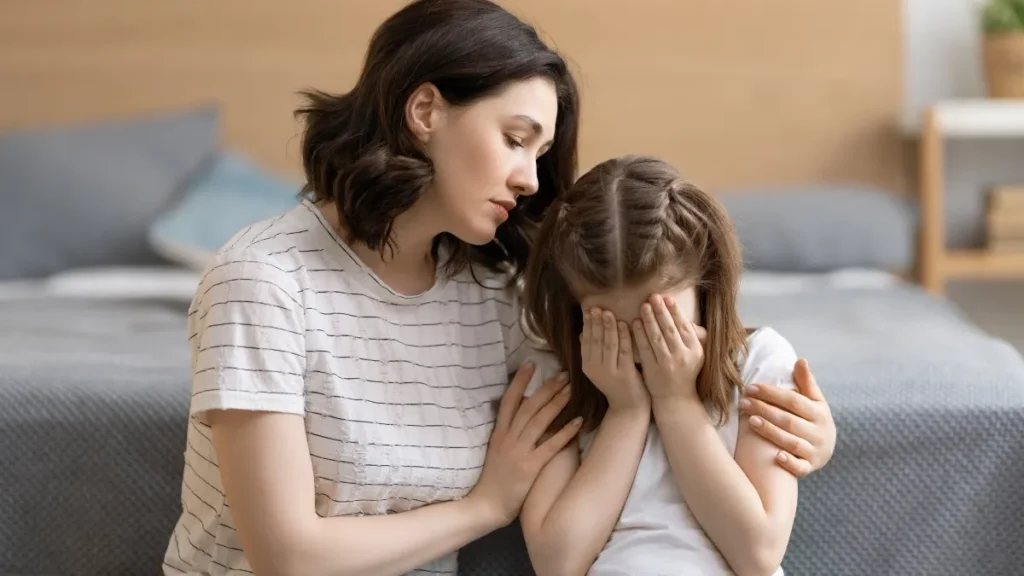We’ve all been there.
In the heat of the moment, our patience wears thin, and our voices rise.
While yelling might get a point across quickly, it can leave both you and your child feeling hurt and disconnected.
Gentle Parenting Response
What Can Your Child Learn When You Ask for an Apology?
When you take responsibility for your actions, you show your child that everyone makes mistakes, and it’s okay to admit them.
More importantly, you demonstrate the power of making amends and rebuilding trust.
This creates a safe space for your child to do the same when they mess up, fostering healthy communication and emotional intelligence.
How do you approach your child after yelling? – Gentle Parenting Response
Here are 6 gentle responses to reconnect:
1. Acknowledge Your Mistake

This doesn’t require a huge production. A simple “Honey, I’m so sorry I yelled at you earlier. That wasn’t okay” works wonders.
This lets your child know their feelings are valid and opens the door for a conversation.
2. Offer a Sincere Apology
Take ownership of your actions without making excuses. Avoid phrases like “but you were…”
Focus on the impact your words had. You could say, “I know my yelling scared you, and I’m truly sorry. I should have handled things differently.”
This shows your child you understand their perspective and are committed to doing better.
Side note: Apology Doesn’t Equal Excuse
It’s important to distinguish between an apology and an excuse. Here’s the difference:
Excuse: “I’m sorry I yelled, but you wouldn’t listen.” (Focuses on the child’s behavior)
Apology: “I’m sorry I yelled. I should have spoken calmly and listened to you better.” (Focuses on your behavior)
3. Validate Their Feelings

Sometimes, the most powerful thing you can say is nothing at all. Let your child express their hurt or anger.
You can say, “I see you’re upset. Would you like to talk about it?” or “It sounds like you’re feeling scared/frustrated. Can you tell me more about what happened?”
This creates a safe space for open communication and shows you value their perspective.
Side note: Active Listening
Active listening goes beyond simply hearing your child’s words. It’s about truly paying attention and showing you understand. Here are some tips:
- Make eye contact and put away distractions.
- Nod your head and use verbal cues like “Uh-huh” or “I see.”
- Summarize what you’ve heard to show you’re paying attention. For example, “So you’re feeling angry because I yelled, and you wish I had talked calmly.”
4. Focus on Moving Forward
Once the initial emotions have settled, it’s time to rebuild.
You can say, “Is there anything I can do to make things right?”
This empowers your child to participate in the repair process. Perhaps it’s a hug, a shared activity, or simply spending some quality time together.
5. Take Responsibility for Your Triggers
Sometimes, yelling is a sign of our own frustration or exhaustion. Consider what might have pushed you over the edge.
Were you feeling overwhelmed, stressed, or hungry? Recognizing your triggers can help you develop coping mechanisms to prevent future outbursts.
Maybe taking a deep breath, counting to ten, or stepping away from the situation for a moment could be helpful.
Talking to your partner or a trusted friend about your stress levels can also provide support.
When you address your triggers, you can avoid letting them control your reactions and create a calmer environment for everyone.
6. Embrace Forgiveness (for Yourself and Your Child)
We all make mistakes. Don’t beat yourself up if you raise your voice. Acknowledge it, apologize sincerely, and then move forward.
The same goes for your child. If they’ve said or done something hurtful in response to your yelling, offer them forgiveness. Remember, open communication is a two-way street.
This doesn’t mean condoning bad behavior, but rather focusing on repairing the relationship and moving forward constructively.
11 Phrases you can Use after you’ve yelled at your kid

1. “I messed up. Yelling wasn’t the way to handle that. Can we talk about it calmly?”
2. “I’m so sorry, that scared you. How can I make it right?”
3. “I hear you’re feeling upset. I should have listened better. Can we cuddle and talk about what happened?”
4. “I know my yelling hurt your feelings. I care about you, and I want to understand what’s going on.”
5. “Taking a deep breath next time might help me calm down. What do you think?” (Involves them in finding solutions)
6. “I’m feeling frustrated, and I shouldn’t have taken it out on you. Is there anything I can do to help?”
7. “Would you like a hug? Sometimes a hug helps me calm down after a disagreement.”
8. “Maybe next time we can use a safe word to let each other know we need a break to cool off.” (Introduces coping mechanisms)
9. “Is there something we can do together that might make you feel better?” (Focuses on reconnection)
10. “Sometimes everyone makes mistakes, even grown-ups. Let’s both try to do better next time.” (Teaches accountability)
11. “I love you, and I’m always here to listen when you’re ready to talk.” (Offers reassurance and open communication)

Conclusion
These moments of repair can be powerful teaching opportunities.
When you acknowledge your mistakes and work to rebuild trust, you show your child valuable life lessons about accountability, empathy, and healthy communication.
This creates a stronger bond and fosters a more positive and peaceful home environment. you can read the power of apologizing to our kids to know more about why say sorry to our child after yelling at them.
